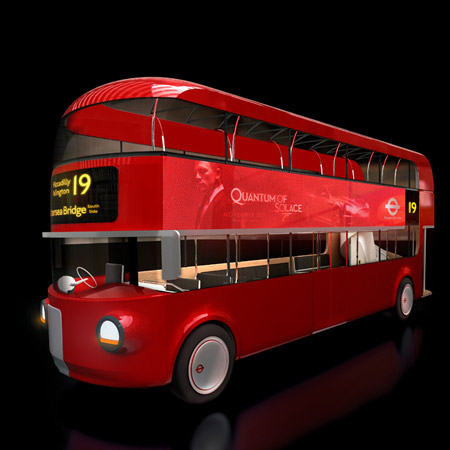
A new bus for London competition winners announced
Car manufacturers Aston Martin and architects Foster + Partners are among the winners of a competition to design a new Routemaster bus for London.
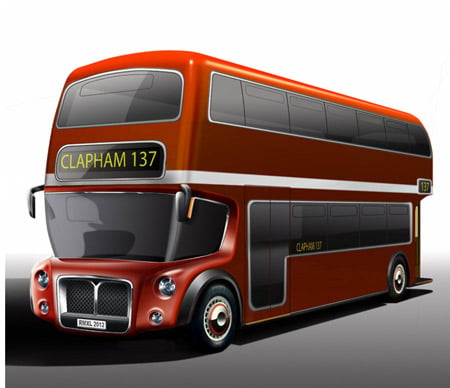
The £25,000 first prize was jointly awarded to Aston Martin and Foster + Partners (top image), and bus, coach and truck design company Capoco Design (above).
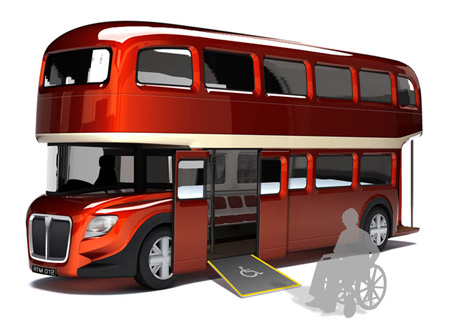
Runners up included Héctor Serrano, Miñarro García and Javier Esteban with their design 'Welcome Back' (above), and Jamie Martin from the UK with a design called 'The London Navigator' (below).
Update: see more images of Serrano, García and Esteban's design in our new story here.
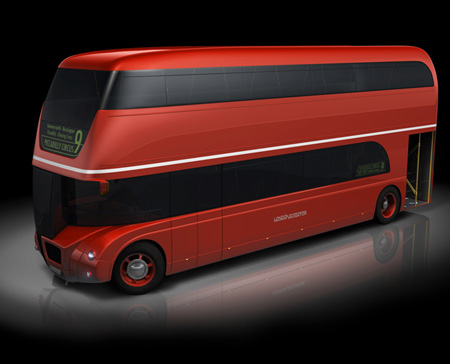
The winning designs and ideas will be developed into final designs by bus manufacturers. The first prototype of the new bus will be produced by 2011.
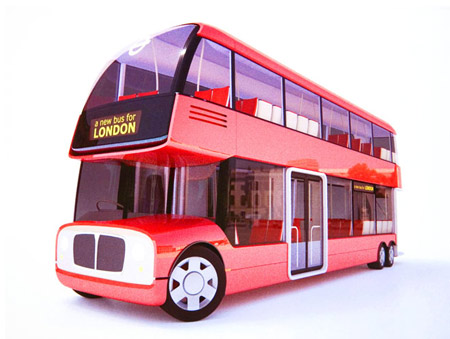
The competition, run by Transport for London, received around 700 entries. Winners are divided into two categories - 'design' and 'imagine', which included entries from children. Above: merit award - Routemaster 2.0 by Concrete, all-round creative, Antwerp, Belgium.
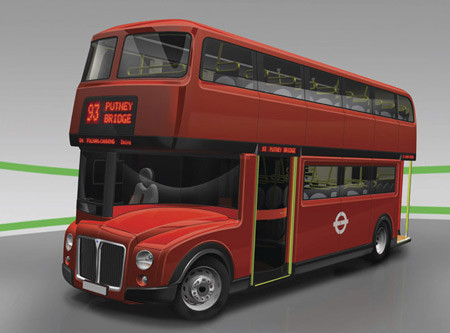
Above: merit award - proposal by LA:UK Design Ltd, Andrew Plumb, Cheshire, UK. The following information is from Transport for London:
--
MAYOR OF LONDON Transport for London
A New Bus for London
The winners: Design a bus for London
In this category we asked entrants with technical skills to submit detailed designs for a double-decker bus that may influence a 21st century Routemaster.
We wanted more than ideas - we wanted vision, and the competition was fierce!
There were two classes within the design category:
- Whole bus: Detailed technical drawings for an entire bus concept
- Elements: Detailed technical drawings for a part or parts of a new bus
The winners of either of these classes may see their designs being taken forward to major bus manufacturers.
225 entries were received in the ‘design’ category (with some entrants submitting a ‘whole bus’ design and some focusing on a particular part or ‘element’ of the bus). Designs were submitted by professionals and non-professionals, by individuals and organisations.
Although the majority of entries were from the UK we did receive quite a few international entries from five continents – Africa, Asia, Australasia, Europe and North America.
‘Whole bus’ design
Joint First:
Aston Martin and Foster + Partners
Capoco Design Ltd
Runners up:
Héctor Serrano Studio, Miñarro García, Javier Esteban
Jamie Martin
Merit awards:
David Bradshaw
Style to Design Ltd
Concrete, all-round creative
LA:UK Design Ltd
Eric Woodcock
‘Element’ design
Merit awards:
Lottie Duke
Rhys Wyman
‘Whole bus’ design
Joint first prize: Aston Martin and Foster + Partners, London
Description of entry: Two emblematic British brands – Aston Martin and Foster + Partners – worked together to challenge preconceptions of bus design. Gathering first-hand research and canvassing passengers, drivers and conductors, the team worked from the inside – out.
Designed in response to the needs of its users, the new bus is zero emissions ready, accessible for all and will set new standards for sustainable vehicles. The bus will reinvent a much-loved London icon for a new era and re-establish the city as a world leader in the design of public transport.
A symbol of place, the bus is also designed to navigate the dense and varied streets of London, employing innovative technologies to allow for greater manoeuvrability on tight corners. Increasing safety and visibility, screens in the cabin allow the driver to supervise CCTV images and both the layout and choice of warm lighting and wooden floors are conceived to foster a spirit of conviviality. The arrangement of the decks is driven by comfort and particular consideration is given to the selection of upholstery to create a ‘living room’ feel, especially in the saloon-like lower deck. The original Routemaster was introduced in 1956 and saw continuous service for almost forty years: the new bus for London is designed to adapt to changing technologies and serve the capital for the next forty years and beyond.
The judges said: “We were impressed with the extent of background research and level of development in this entry by Aston Martin and Foster + Partners. The overall concept was meticulously and artistically presented and displayed. We particularly liked the overall styling package, especially the rear end, and heritage cues from the original Routemaster such as the use of wood flooring. Other innovations included a drive-by-wire system, solar panels built into the glass roof, and LED –based moving advertising displays.”
‘Whole bus’ design
Joint first prize: Capoco Design Ltd, Alan Ponsford, Salisbury
Description of entry: The entry was initially prompted by the perfect celestial alignment of media interest, wide public interest and pivotal mayoral interest. These factors were underpinned by the basic foundation that Capoco is a bus design company, and bus design competitions are few and far between. In fact, this is the first in our 30+ year history so a very welcome and apposite initiative.
Our design approach was to combine the best of the old with the best of the new. Whilst the Routemaster was a fine design in its day, it had an impenetrable saloon for some users due to the high step. Also, although it was light, it was based on a simple truck-like powertrain that did not allow for the more recent technological advances.
So our new design has a low flat floor to allow easy access for all, plus an efficient series hybrid electric drive to reduce both the fuel consumption and emissions. But it retains the Routemaster family lineage, with a front engine, open rear platform and an individual face.
The judges said: “The Capoco submission was technically excellent. We felt the design featured many novel and innovative approaches which were capable of being incorporated as practical proposals and carried through to a potential manufacturing stage. Details that were particularly impressive were the light-weight structure and the hybrid propulsion and drive-train system. The design met all the stated aims of the competition and was presented in a stylised package that displayed deliberate and strong links to the original Routemaster.”
‘Whole bus’ design
Runner up: Héctor Serrano Studio, London, Miñarro García, Valencia, Javier Esteban, Barcelona
Project name: Welcome Back
The project is the evolution of the iconic Routemaster, an innovative vehicle combining the best of the past with the best of now. A unique bus tailored to London. A brand new London classic that retains that much appreciated friendly and warm feeling from the Routemaster. A compact bus for a compact city, the vehicle can move easily around London’s narrow streets. One of the most characteristic features is the diagonal window that celebrates our double-decker bus by visually externalizing the stairs. To improve safety we have incorporated a lighting system into the floor of the rear entrance platform that informs passengers and vehicles when the bus is about to move. This is a truly sustainable vehicle using a Hybrid Diesel- electric Drive System and solar panel to recharge the energy storage module. Its smaller size also means less weight so less fuel and less exhaust emissions are produced.
The judges said: “The compact design from the Héctor Serrano Studio, Miñarro García and Javier Esteban is a visual reincarnation of the Routemaster but with a very 21st century treatment. A hybrid diesel-electric drive-train and regenerative braking system were proposed to keep weight and emissions to a minimum, coupled with a solar-panel roof for top-up energy. We were particularly impressed with the wide doors, stairs and aisles as well as a stop-go lighting system for the rear platform to enhance passenger safety. Other features included indirect roof lighting and cantilever seating for ease of floor cleaning.”
‘Whole bus’ design
Runner up: Jamie Martin, Surbiton
Description of entry: The ‘London Navigator’ has been conceptualised as a spiritual successor to the now classic Routemaster bus. The Routemaster is regarded as one of the key recognisable icons of London. I felt that an equally distinctive replacement for the Routemaster is required to retain this iconography; a stylish red bus that can only be associated with London, is easily distinguishable from the standard double-decker or bendy bus, and is quintessentially British. The overall approach has been to produce a unique and recognisable design; a functional yet characterful new icon for London.
The judges said: “Jamie Martin’s entry was an early favourite for its bold and modern take on original Routemaster lines, especially the rear curved roof-line. The clean styling aspects were clearly derived from original features, particularly the radiator and badging. The concept reflected the considerable effort taken to provide realistic modelling and rendering from a range of viewpoints and angles. Beyond purely stylistic features, considerable thought had gone into the component layout (e. g. hybrid drive through to rear axle electric hub motors), hand rail design and a novel safety barrier for the rear platform.”
The winners: Imagine a bus for London
Imagine winners
In this category we asked entrants to unleash their imagination and defy conventional thinking to come up with ideas for London's new bus.
We didn't ask for details. We didn't ask for technical expertise.
We just asked for inspirational ideas - and we got loads!
There were four classes in the imagine category, all age-based. The only requirement was to send us an imaginative drawing or sketch with a short explanation of the thinking behind it.
475 entries were received in the ‘imagine’ category, mostly from the UK. The entries were divided into four age categories, under 11s, 11-16 year olds, 16-18 year olds and over 18s.
Under 11s
First prize: Thomas Staricoff, UK, Olivia Carrier, UK
Second prize: Luke Brennan, UK
Third prize: Yasmin Ali, UK
Merit: Hana Broadhurst, UK, Takeo Broadhurst, UK
11-15
First prize: Dolapo Okunlola, UK
Second prize: Ben Holmes, UK
Third prize: Albert Braid, UK
16-18
First prize: Nicholas Cho, UK
Second prize: Craig Tomkins, UK
Third prize: Charlotte Taylor, UK
Over 18s
First prize: Frances Faulder, UK
Second prize: Matt Belcher, UK
Third Prize: Alan Thorley, UK
Merit: Laszlo Vass, Barnet, UK
Judges’ comments:
“We were delighted with the number of designs submitted in this category – the competition clearly appealed to a wide range of people who obviously put a lot of thought and effort into their designs for a new bus for London.
“A number of themes came out in the ‘imagine’ category – we were very impressed to see how many entrants considered accessibility issues in their design. The environment was also at the top of the agenda with a lot of designs showing hybrid engines or other green technologies powering the bus.
“Entrants gave a lot of thought to how to make bus travel more comfortable for passengers, with several designs including blinds, curtains, soft seats or quiet zones. Younger designers had entertainment in mind, with dedicated play zones on the bus or games consoles for passengers to use.
“Overall, it was a fantastic response which exceeded our expectations; and it was a tough job choosing the winning designs.”
We've chosen the winners and got loads of great ideas for London's new bus - so where do we go from here?
The aim of our competition was to harvest a range of creative ideas for a bus fit for the 21st century. We will now pass the best designs and concepts on to bus manufacturers, so they can be developed into final design proposals.
A competitive tendering process will then determine to which company we award the final contract to build the new bus for London. This should be decided by the end of next year.
The first prototype of the new bus will be on the streets of London by 2011.